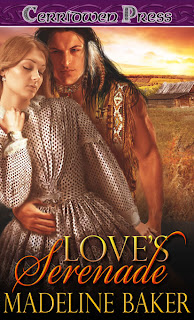
Judith’s review of Love’s Serenade by Madeline Baker.
An Anthology
Loving Sarah . . .
When the Apache raid Sarah’s homestead, killing her husband and kidnapping her son, her world is shattered. She is sure she can’t survive on the plains alone, but someone is looking out for her, bringing her baskets of food and clothing, keeping her safe. Sarah finally meets her benefactor: an Apache warrior called Toklanni who was sent to kill her, but who has fallen in love instead–he couldn’t kill her becuase she looks so much like his mother. Together they begin to build a life, but it is incomplete without Sarah’s son. As Christmas approaches, Toklanni sets out to find him, determined to reunite their family.
Loving Devlin . . .
After rescuing Sarah’s son from the Apache, Sarah and Toklanni–now known by his “white” name of Devlin, thought their hard times were over. Their ranch was doing well and Sarah was nearly seven months pregnant with their child. Then a gang of Commanche swept through, burning their homestead and kidnapping Sarah. Devlin heads after them, but getting Sarah back requires a journey deep into enemy territory. Far from the comforts of home, they find themselves creating their own Christmas miracle.
This is an anthology containing two novellas, both highlighting the clash of cultures and lifestyles between the white pioneer settlers and the Native American tribes. Ownership of the land was very different in Indian understanding from the white pioneers. Each tribe had its own territory but did not see themselves as “owners” of the land. The earth was a gift to them and they saw it as their responsibility to care for it and tend it. In turn, the earth fed and clothed them and sustained their lives and communities. Now the white settlers have come, “bought” their land and “stolen” it from their tribe. Thus it was deemed acceptable to raid, kill, and kidnap the whites who had desecrated their part of the earth.
Toklanni was an Apache warrior whose mother had been a white captive and whose father was Apache. He has adopted the Apache life fully, but was always just on the fringes of the tribal life. His half-brother had led the raid against Sarah’s family in retribution for the killing of Apaches by the soldiers. But Toklanni cannot kill Sarah–in fact, he begins to watch over her in her isolation, bringing her food and firewood in the dark of the night. When he is attacked by three white men and left for dead, it is Sarah that nurses him back to health and they eventually solidify their relationship and marry in the town church. The only missing piece in their family happiness is Sarah’s kidnapped son, Danny, and Toklanni sets out to bring her peace as well as bring Danny home from his home village where he has been “adopted” by Toklanni’s half brother.
This story and the following story of Devlin’s rescue of Sarah from the Commanche, arch enemies of the Apache, is really two tales of this culture clash, an examination of the respective values and ways of understanding reality, the ordering of family life, and the relationship to the land of each culture. Both are also tales in which Sarah and Devlin must come to peace with their own roots. Devlin lives in Sarah’s world because he loves her and wants her happiness above all things. But he must still contend with his Apache side, and his journey to rescue Danny as well as his need to reclaim Sarah bring him face to face with his roots in The People (as the Apache call themselves) and how that has shaped him as a human being. Both stories are filled with what is often called “human interest” — the story behind the story. Sarah’s love and acceptance of Devlin/Toklanni is never in question. The problem lies in how Devlin/Toklanni sees himself.
In many respects, Devlin and Sarah are people who are larger than life. They are both loving and giving, and their story reminds the reader that how we value our earth, how we value life itself, how we value one another orders our actions and dictates how we live. It is a wonderful anthology which embraces the history of America’s expansion into was was formerly Native American territories. It brings the reader face to face with the prejudice between whites and Indians, but in a very gentle way exposes the rootlessness of that prejudice. It also examines the anger and animosity between the Indian tribes themselves. Often their only commonality was their hatred of the whites.
I found these stories to be very readable which testifies to the fact that Ms Baker has produced stories that are, at the foundation, very well written. The plot is a common one and is rooted in our history. But the story line is creative and while kidnapping, Indian raids and such were not uncommon, the resolution of Devlin and Sarah’s crises is very well crafted.
This is a very nice historical anthology. I recommend it to those who enjoy historicals set in the Old West. I give this book a rating of 4 out of 5.
This book is available from Cerridwen Press. You can buy it here in e-format.
You can read more from Judith at Dr. J’s Book Place.
